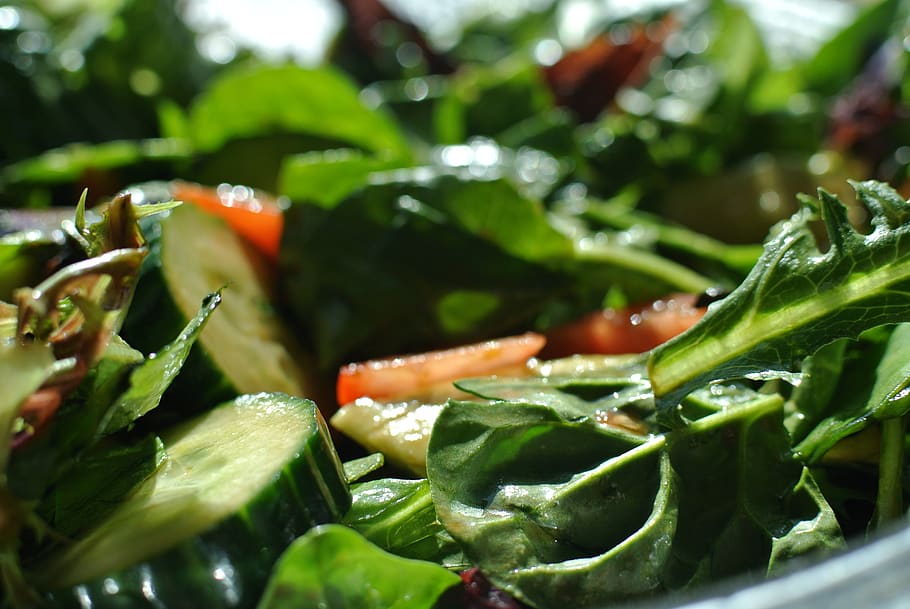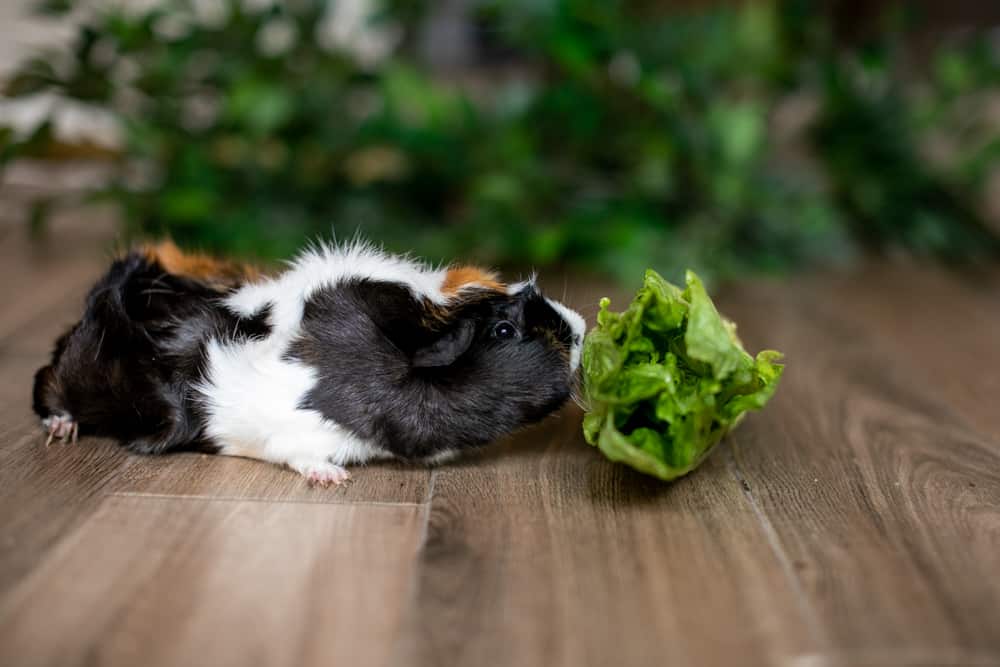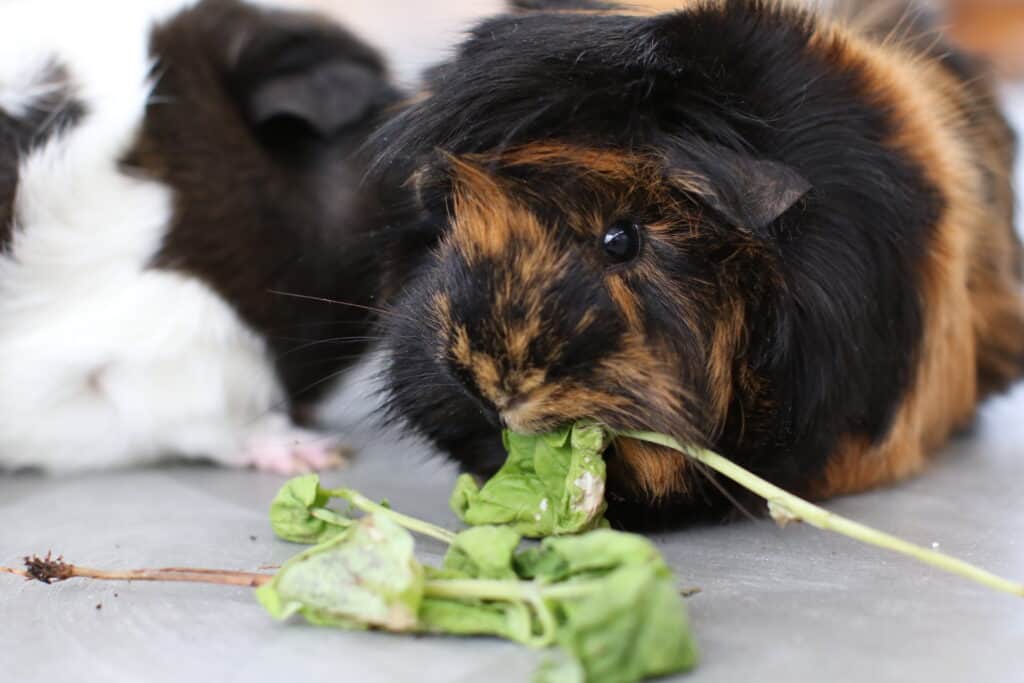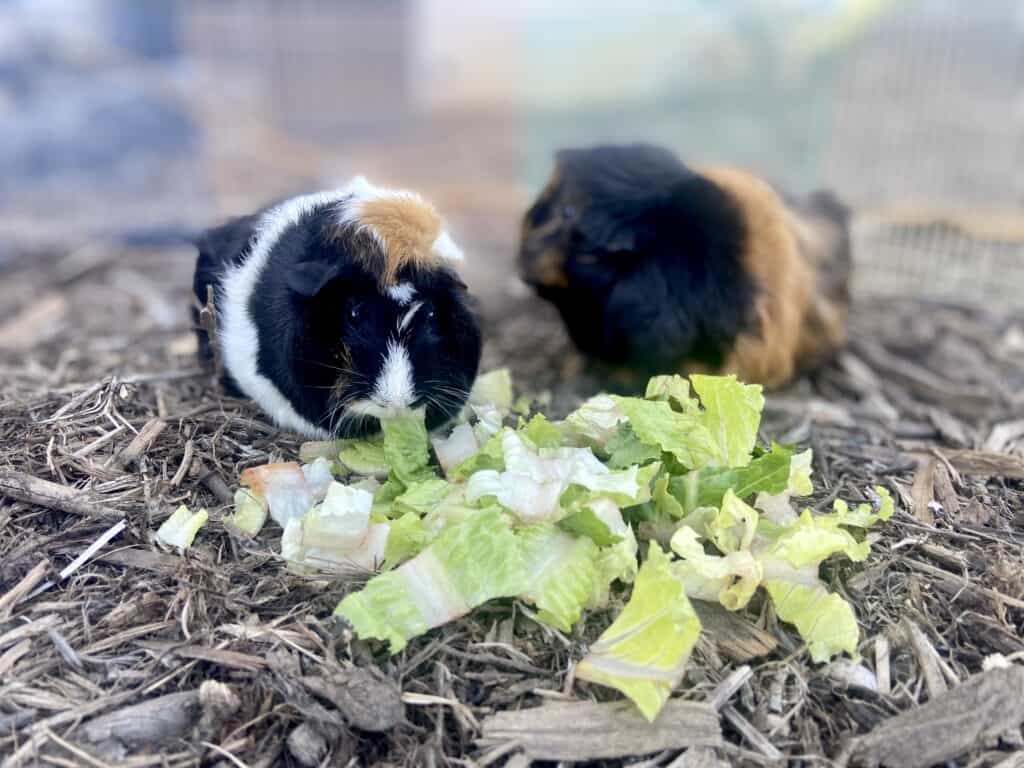As an Amazon Associate we earn from qualifying purchases.
Guinea pigs can be given a variety of fresh vegetables and fruits, including leafy greens like romaine lettuce.
However, guinea pigs can’t eat certain things that are perfectly safe for other animals to consume. For example, can guinea pigs eat spring mix?
Spring salad mix is made up primarily of leafy greens such as romaine lettuce, spinach, and arugula.
While these greens are generally safe for guinea pigs to eat, it’s important to avoid giving them too much because they can contain high levels of nitrates.
Excessive amounts of nitrates can cause your guinea pig’s health to deteriorate, so it’s best to feed them a small amount of spring mix and monitor their reaction.
Is Spring Mix Safe for Guinea Pigs to Eat?
Leafy greens are a great way for guinea pigs to get their nutritional needs met. However, not all types of veggies are safe for guinea pigs to eat. So, is spring mix safe for guinea pigs?

Spring mix salad is a combination of different leafy greens that can vary depending on the season. It can include things like arugula, romaine lettuce, endive, spinach, carrots, and watercress.
While some of the ingredients in the spring mix may be safe for guinea pigs to eat, other ingredients may not be.
For instance, arugula can contain mustard oils which can be harmful to guinea pigs.
So, is it safe for guinea pigs to eat spring mix? It depends on the ingredients in the mix. If you are unsure if a particular ingredient is safe for guinea pigs, it is best to avoid giving it to them.
Instead, stick with leafy greens that are known to be safe for guinea pigs, like romaine lettuce, spinach, and watercress.
Note that some market-bought spring mixes contain greens like spinach and onion, which may be harmful to guinea pigs. So, it is always best to check the ingredients before feeding the spring mix to your guinea pig.
Nutritional Benefits of Spring Mix for Guinea Pigs
Spring mix is a salad that typically contains a variety of greens such as arugula, fresh lettuce greens, chard, kale, radicchio, carrots, and spinach. It also includes herbs such as basil, chives, mint, oregano, and parsley.

Spring mix is a great source of nutrients for guinea pigs, including vitamin A, vitamin C, vitamin K, calcium, iron, and potassium.
Vitamin A is important for eye health and vision. Guinea pigs that eat a diet rich in vitamin A are less likely to develop eye problems such as cataracts.
Vitamin C is essential for the immune system and helps guinea pigs fight off infection. Vitamin K is important for blood clotting and helps prevent bleeding from minor scrapes and cuts.
Calcium is important for bone health, and iron helps keep the blood healthy. Potassium is necessary for muscle function and electrical activity in the heart.
Spring mix also contains antioxidants, which help protect the body from harmful chemicals called free radicals.
Free radicals can damage cells and contribute to the development of diseases such as cancer. Antioxidants scavenge free radicals and help protect cells from damage.
Many types of spring mix are also low in calories and carbohydrates, making them a good choice for guinea pigs on a weight loss or diabetes diet.
So, can guinea pigs eat spring mix? Yes, they can! Spring mix is a healthy and nutritious salad that provides a variety of essential nutrients.

Why Should You Feed Spring Mixes to Your Guinea Pigs?
There are many reasons why guinea pig owners should feed their guinea pigs spring mixes. Here are some of the most important benefits:
- Spring mixes are a great way to provide your guinea pigs with a healthy, balanced diet. They are packed with nutrients and vitamins that your guinea pigs need to stay healthy.
- Spring mixes are space-saving. Unlike other types of food, you can fit a lot of salad into a small container. This makes it easy to bring with you on trips or to store in your fridge.
- Spring mixes are easy to prepare. All you have to do is wash the salad and cut it into pieces that your guinea pigs can eat. There is no cooking required.
- Spring mixes are a great way to get your guinea pigs to eat their vegetables. Many guinea pigs are picky eaters, but guinea pigs love salad.
- Spring mixes are time-saving. You can prepare a salad in just a few minutes, and it will last in your fridge for several days. This is much quicker than cooking food for your guinea pigs.
- Spring mixes are affordable. You can buy a salad mix for a fraction of the price of other types of food.
- Spring mixes are healthy and nutritious. They provide your guinea pigs with essential vitamins and minerals that they cannot get from other foods.
- Spring mixes are easy to digest. This makes them a good choice for guinea pigs who have trouble digesting other types of food.
- Spring mixes are a great way to add variety to your guinea pigs’ diet. They can get bored of eating the same thing every day, but with a salad mix, they will have different food to eat every day.
- Spring mixes are fun and exciting for guinea pigs. They love exploring new things, and salad greens are no exception. Try giving your guinea pigs a salad mix to see how much they enjoy it!
Overall, there are many reasons why you should feed your guinea pigs spring mixes. They are a healthy, balanced, and affordable way to provide your guinea pigs with the nutrients they need. They are also a great way to get your guinea pigs to eat their vegetables.
So next time you are at the grocery store, be sure to pick up a salad mix for your guinea pigs!
How Often Should My Guinea Pigs Eat Spring Mix?
Guinea pigs should have a diet that consists mostly of hay, fresh vegetables, and a small number of pellets.
You can give your guinea pig a small amount of spring mix as a special treat, but it’s not necessary for them to eat it every day.
In terms of how often to give spring mix to your guinea pig, it’s best to introduce spring mix salad to your furry friend with just a few leaves and see how it does.
If your guinea pig seems to like it and doesn’t get sick after eating it, you can give them a little bit more every day or so. But if they start having tummy troubles, then you should back off and only give them salad once in a while.

Potential Side Effects of Feeding a Guinea Pig Spring Mix
When it comes to what guinea pigs can and cannot eat, there are a lot of misconceptions.
For example, many people think that guinea pigs can’t eat hay, when in fact they need hay in their diet in order to stay healthy.
The same goes for spring mix – while it may be healthy for humans, it can have some potential side effects when fed to guinea pigs.
One of the main problems with feeding guinea pigs spring mix is that it is high in fiber. While fiber is an important part of a guinea pig’s diet, too much can actually be harmful.
Guinea pigs who consume too much fiber can develop gastrointestinal problems, such as diarrhea and constipation. They may also start to lose weight since they are not able to absorb all of the nutrients from their food.
Another issue with feeding spring mix to guinea pigs is that it may have high calcium content. This is not good if you have a senior guinea pig, as it can lead to health problems such as kidney stones.
So, should you avoid feeding your guinea pig spring mix?
Not necessarily. Just make sure that you only give them a small amount at a time, and keep an eye on your guinea pig’s health to make sure that they’re not developing any problems.
If your guinea pig seems to be having trouble digesting the spring mix, try switching to a different type of vegetable.
There are plenty of other healthy guinea pig diet options out there, so don’t feel like you have to stick with spring mix.
Bottom Line
Guinea pigs can eat spring mix, but it’s important to make sure that the leaves are washed and free of any chemicals or pesticides. Spring mix is a great source of fiber and vitamins for guinea pigs and should be part of a healthy diet for these animals. Overall, guinea pigs can eat most types of vegetables, fruits, and herbs, so experiment with different types of spring mix to find the best variety for your guinea pig.